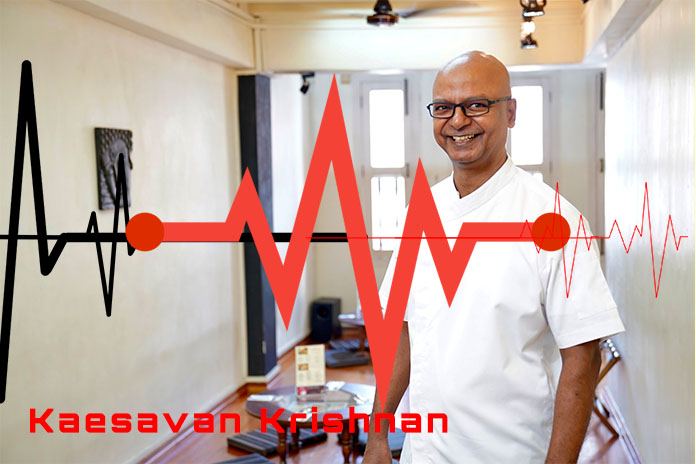
WHETHER we eat to live or live to eat, we have to eat.
As we watch the COVID-19 pandemic shred the food and beverage industry in a few savage months, it’s becoming evident that many restaurants and bars have been surviving on a hand-to-mouth basis.
The expected fallout resulting from the pandemic is going to affect our dining options, even as many restaurants are resorting to home delivery services and takeaways to try and stay in the game.
We’ll Do It Ourselves
Investment banker turned restaurateur, Kaesavan Krishnan, opened Lagnaa in late 2004.
His $5,000 investment and skills as a third-generation chef helped to grow the fortunes of this restaurant in Little India, where diners sit on the floor to enjoy the Indian fare.
When COVID-19 hit and the restaurants were forced to shutter their inhouse dining spaces, Kaesavan had to find new ways to reach customers. Takeaway food was an option, but generally, its value to the business is often very small. Besides, with people staying in, who was going to venture out?
So, the delivery app was the next best bet.
“Times like this, the delivery platform is a must-have for most restaurants, self-operated, or otherwise.”
But the middleman was getting the spoils.
“We realised very quickly that delivery apps like Deliveroo, GrabFood and FoodPanda suck up 30% of the revenue, and that means they are not only eating into the margin, but we could be making a loss for every delivery,” Kaesavan explains.
“When using delivery apps, the restaurants are also affected by the delayed payout. Restaurants are a cash business, and this delay in payment affects the cash flow.”
ALSO READ: Law Firms Prepare For The Post-Pandemic Era
Undeterred, Kaesavan decided to build his own delivery app.
“After much research, we chose to use a Singapore startup, NinjaOS as our primary delivery platform. The cost is reasonable (US$75 per month) and the solution can be customised to fit our needs.”
Lagnaa set up its own driver database to work directly with the restaurant. Kaesavan says he will share this list with other restaurants keen to access this pool of drivers.
To keep the engagement with its clients alive, Lagnaa has also converted its ongoing activities into virtual eating events, like the monthly chilli challenge, food tasting and cooking classes.
ALSO READ: Going On The Offensive in The Face Of COVID-19

Pause The Show
The Grand master of the local food entertainment scene is pondering the future of his World Gourmet Summit (WGS), an international event which afixed Singapore on the global culinary map.
Peter Knipp Holdings (PKH) has been serving up this annual culinary feast since 1997, drawing in chefs the world over to showcase their creations in Singapore’s restaurants.
COVID-19 has put this year’s event in doubt.
“We’ve moved it to August/September for now. If we can’t get it going by then, we’ll have a major issue. We may then do some smaller events and have the big one next year,” Peter Knipp says.
“We’ve had 28 restaurants as part of WGS over the years, and we’ve now lost 3 or 4 of them. We won’t know the full extent of the damage caused by this pandemic until it’s over.”
The pandemic’s effects are going to be long-lasting and will have a severe impact on the dining scene.
But, Peter admits, the business has been feeling the heat for the past 3 years.
“There were too many competitors, though we did well by managing expenses, income and overheads. The other businesses of PKH have had mixed fortunes. Our food consultancy business has picked up, but the communications business is facing difficult times.
Peter reckons the next 12 to 24 months will see a lot of businesses in the food industry folding. “It’s next to impossible to do a clear-cut forecast.”
For now, food businesses are reacting to the immediate threats and trying to find solutions. Food delivery services are serving as an important connection between the consumer and the restaurant, but may not be building good partnerships.
“You cannot slap on a 30% charge whether the bill is $10 or $200. There’s nothing left for the restaurant. There needs to be a different formula. Everyone is trying to milk the cow for as long as they can,” he reckons.
“Delivery companies may make the money now, but operators will remember who treated them well.”
ALSO READ: Are We Closer To A Covid-19 Treatment?

Stay Liquid
To keep his business viable, Loh Lik Peng had to shut down operations.
When news of COVID-19 first exploded in China, the Director of Unlisted Collection, with hotels and restaurants in both hemispheres, initially adopted the protocols that were in place during Sars.
“We stocked up on key items like sanitisers and thermometers for our businesses globally,” Lik Peng says. But the scenario proved quite different to Sars, and once the lockdowns were instituted, all bets were off.
“It caught me by surprise; the speed, scale, width and depth of the impact. We had a business continuity plan, but that more or less went out the window very quickly with the lockdowns which rendered most of those early actions nugatory. Then it was all about liquidity and cashflow and speed of action in reducing costs,” he admits.
“Within the space of two weeks all our businesses from the northern hemisphere to the southern hemisphere were effectively shut down.”
This allowed Lik Peng to keep the businesses functional for at least another year, maybe more.
Beyond that, he sees the credit risk rising and he will need to be extra cautious with his business moves.
“Liquidity is the most important thing. Nothing else matters without adequate liquidity buffers. Deleveraging will also be important,” he reckons.
“I expect the taxes in every country we operate in to rise fairly substantially in the future.”
As for customers, they will be there, but it may take a “few painful years to normalise and grow the numbers”.
Depending on how the drama of the COVID-19 pandemic unfolds and comes to a rest, the recipe for running a food business will have to be rewritten and updated.
If you have a point of view on COVID-19, or think someone you know could present a thought-provoking perspective on the subject, please email editor@storm-asia.com with your details and a short summary.




















